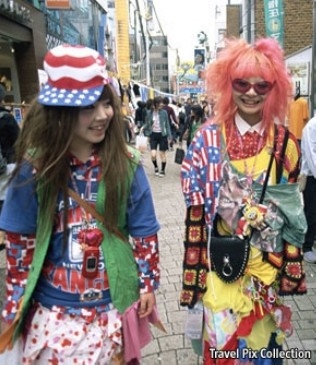(单词翻译:单击)

Business Branding Japan as "cool" No limits, no laws
商业 日本贴上"酷"标签 日本文化要大展拳脚
The beautiful people join hands with the bureaucrats
潮人联手官员共同推进"酷日本"
THE Tokyo headquarters of Japan's Ministry of Economy, Trade and Industry (METI) was the cockpit for the country's post-war economic miracle.
坐落于东京本部的日本经济产业省(METI)在战后的经济奇迹中扮演了急先锋的角色,如今却墨守成规,不复当年勇。
But these days it is a stodgy place. The decor barely brightens even when you enter the offices of "The Cool Japan Promotion Strategy Programme".
即使走进"酷日本推广战略项目"办公室,室内装饰也让人打不起精神。
There is not an Apple MacBook in sight, and demure "office ladies" still serve the tea.
屋里看不到苹果笔记本电脑,看到的是死气沉沉的白领丽人们依旧在端茶倒水。
But METI wants to let its hair down.
可METI想一改严肃的面孔。
With the former bastions of Japan's economy, such as cars and electronics, facing stiff competition from South Korea, China and elsewhere,
像汽车,电子这些一度是日本经济堡垒的产业,正面对韩国,中国等国的激烈竞争。
it is looking for alternative sources of growth in so-called creative industries, such as fashion, music, food and anime (cartoons).
日本把目光转向了所谓的创意产业,比如时尚,音乐,食物和卡通,以此作为经济增长的另一个来源。
The search has become more intense since March 11th when a nuclear accident battered Japan's image abroad.
自从3月11日的核事故发生之后,日本在海外的形象大打折扣,
(So blanket was the repudiation, according to Interbrand, a consultancy, that it hurt even Hyundai, a South Korean car firm sometimes mistakenly thought to be Japanese.)
(咨询公司Interbrand称,日本的声誉受到的损害如此之大,连有时被误认为日本公司的韩国汽车制造商现代公司都受其拖累)
"We have to rebrand Japan," says METI's Tetsuya Watanabe.
因此对"酷日本"的探索也紧锣密鼓起来,"我们要重塑日本,"
He describes March 11th as a "boiling-frog" moment—when Japan suddenly woke up to its industrial decline.
来自METI的澈夜渡边如是说,他把3.11当作"沸水青蛙",从这个转折点——日本猛然意识到自己日渐衰落的工业。
The aim is to spur a nearly fivefold increase in cultural exports by 2020, to ¥11 trillion ($140 billion)—almost as much as Japan earns from car exports.
此项目旨在到2020年,刺激文化出口达11万亿(1400亿美元),相当于现在的5倍——与日本汽车出口相差无几。
In the hands of civil servants, the plans for this are not exactly zinging.
在官员的监督下,这个项目并非那么随心所欲。
One milestone in the Cool Japan campaign is, bewilderingly, a gathering of the IMF and World Bank in Tokyo next year.
"酷日本"活动一个里程碑事件是明年是IMF和World Bank 将聚首东京,此举让人摸不着头脑。
Yet young Japanese designers, artists, chefs and pop stars have flocked to it—not despite METI's involvement, but because of it. Takashi Koyama, a fashion designer, says Japan's hottest trendsetters are too niche to expand abroad on their own.
目前年轻的日本设计师,艺术家,厨师以及流行明星们对"酷日本"项目可谓蜂拥而至——不是为了响应METI的号召,而是一心为了提高日本的知名度。
Without METI's clout, he says, they would be copied by cheaper South Korean rivals, who have expanded abroad more aggressively in recent years.
设计师高司木山说,日本最潮的东西都过于小众化,仅凭一己之力难以扩散到国外。
He says that March 11th was a wake-up call to Japan's creative industries, too.
要是没有METI的支持,潮流产品就会被近年来文化输出势头迅猛的对手韩国"山寨"。
"If we don't go abroad, we will perish," he says.
他还说3?11对日本的创意工业也是个警醒,如果不走出岛外,这个产业就将消亡。
On October 7th 14 small Japanese labels, supported by METI, kicked off the Cool Japan campaign by opening a temporary store in Singapore called Harajuku Street Style, named after Tokyo's edgy fashion district (pictured).
10月7日,由METI扶持的14家日本小品牌,在新加坡开了一家试营店,名叫"原宿街风情",以东京的潮流时尚聚集地命名。
The aim was not just to promote Japanese brands, says Mr Koyama.
(见图)"酷日本"活动也由此拉开序幕。
It was to promote the "atmosphere" of fashion in Japan, a what-the-heck attitude to mixing items and styles of clothing.
木山说这不仅是为了提升日本品牌的知名度,也是为了宣扬日本时尚的氛围,对衣服搭配随心所欲的一种怡然自得的态度。
"No rules, no regulations," is how he describes this.
"没有规矩,没有限制,"木山这样描述到。
If only Japan's economic policymakers would apply that dictum more widely
要是日本的经济决策者在制定决策时能"没有规矩,没有限制",少一些条条框框就好了。


